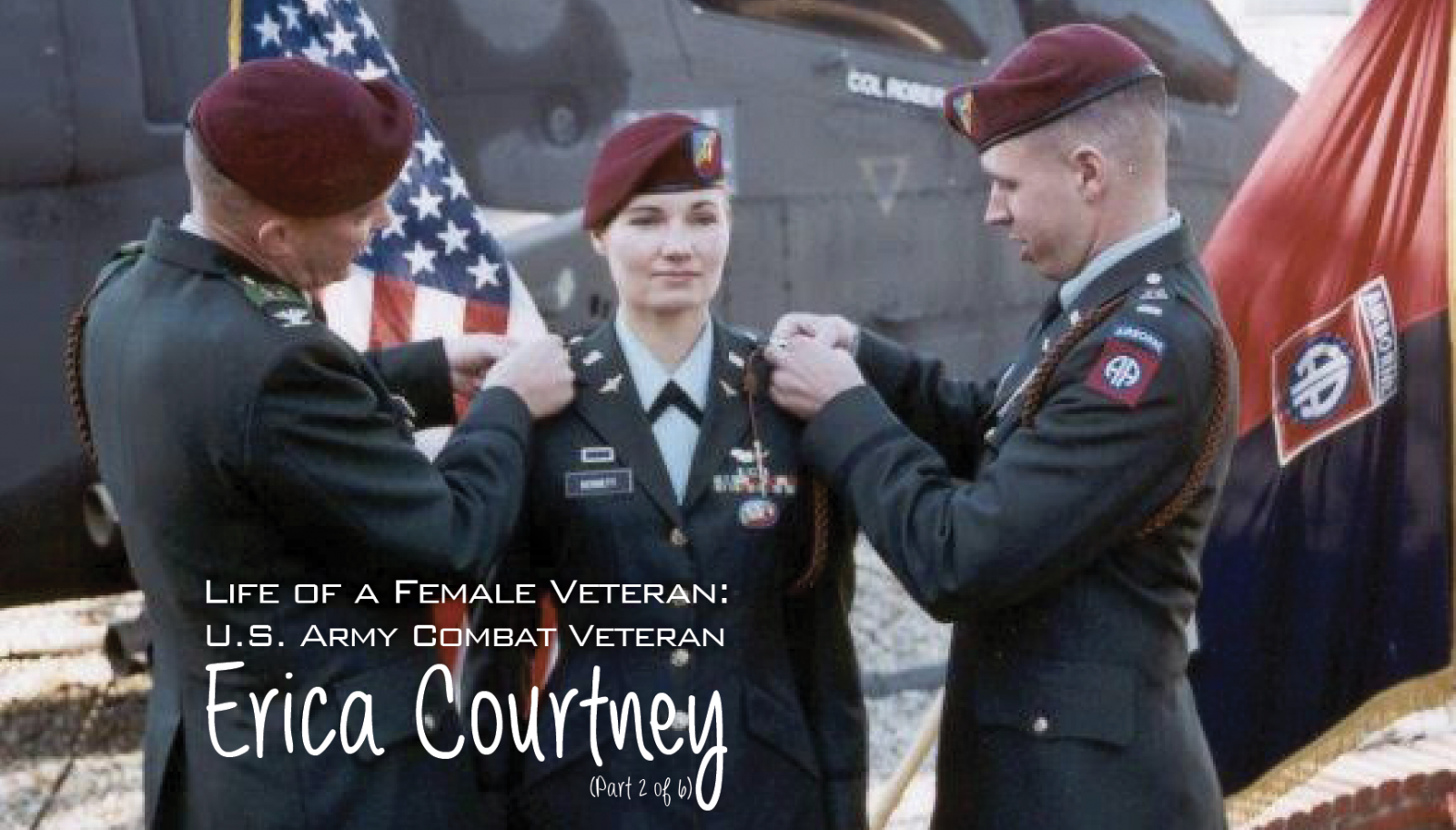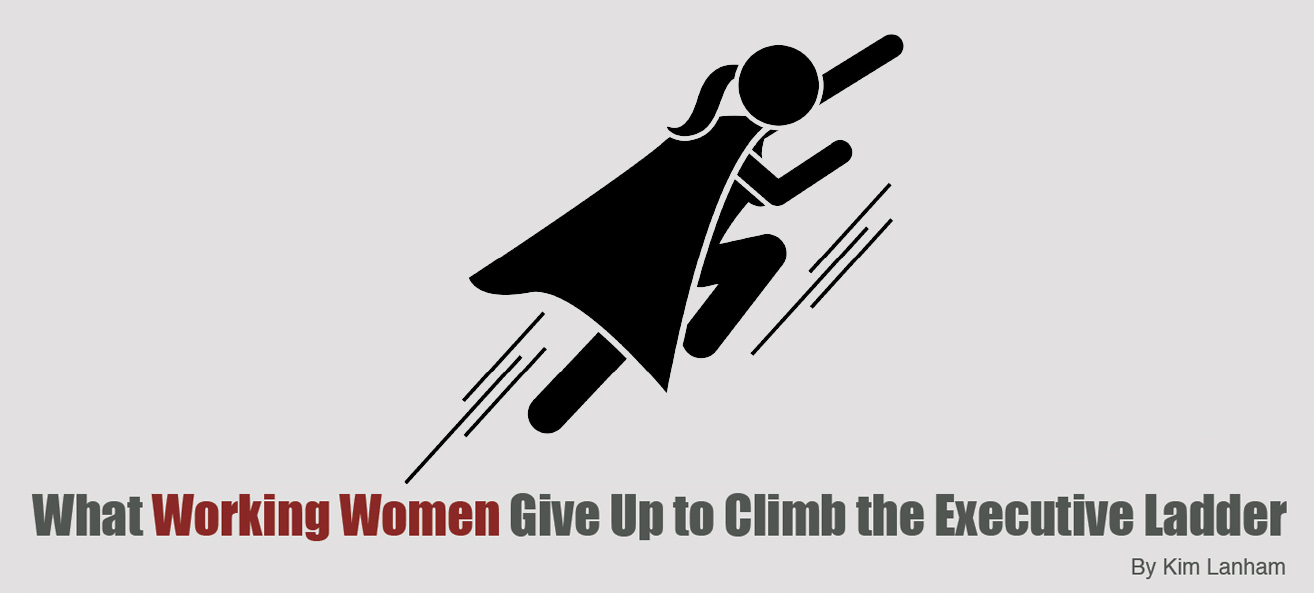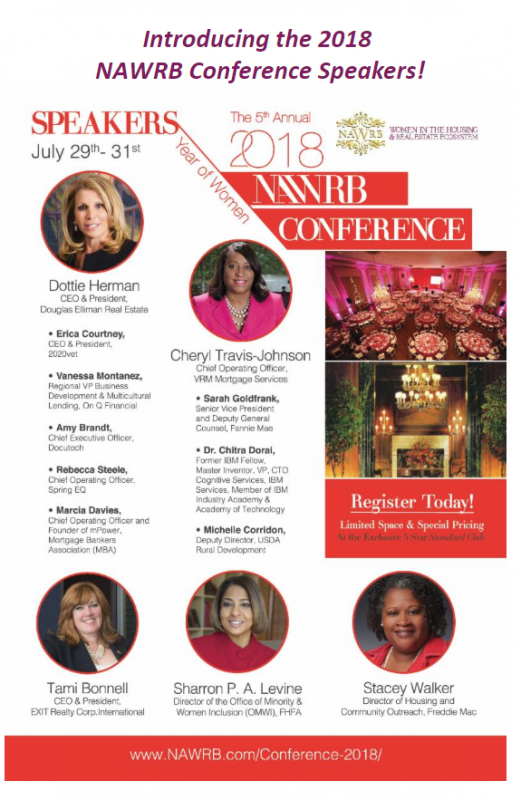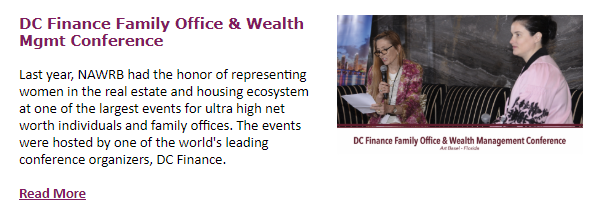
Know an Incredible Woman Preserving the
Quality of Life During COVID-19?
Submit your story today!
Read More

Consulting & Branding Opportunities
Grant your business access to insider,
proven knowledge to improve the quality of your procured
services and maximize business performance.

If you need D&I
Contact Us!
A Team Focused on Bring Diversity and Inclusion to Every Level
Learn More

#1 Top Real Estate Influencer
Desiree Patno
Diversity & Inclusion, Quality of Life, Know the Rules of the Game ®
Your Next Event
Grow Your Business
NAWRB: An SBA Resource
NAWRB is listed as a women-owned business resource for the SBA.
Check It Out
NAWRB Aging Population
Help Protect Elders
from Financial Abuse
Over $36.5 billion a year is lost annually in the U.S.
Prevent Financial Abuse

Women's Homeownership:
Dream. Stability. Sanctuary.
Life often presents us
with unplanned disruptions.

AI Technology
with
a Human Touch
Is
The Perfect Balance


NAWRB Women's Global Resource Center
A women’s depository for vendors & clients to grow their diverse spend & increase women’s employment at all levels within the housing ecosystem.

Monthly Archives: May 2018
The Fight for Women at Art Basel
With a busy schedule you’d need a guidebook to navigate, I never have enough time in the day to connect with everyone I want to. Oftentimes, by the time I remember that I wanted to call a colleague with a quick thought, it’s two in the morning and my puppies are crying for me to come to bed. Once in a while, though, I see something that is riveting.
I recently attended Art Basel 2017 and was deeply impacted by the connections I formed and the beautiful artwork abounding throughout Miami Beach. I had a cathartic experience when my eyes settled on the work of Italian artist El Gato Chimney. My excitement must have been obvious as I was captivated by the color and images in his work.
The painting I fixated on depicts a swan with a community of burning birdhouses on its back. Held down by ropes, and bleeding from its battle, the resolute swan won’t succumb to its restraints and fights to gain its flight and freedom. A different painting similarly portrays a bird with smoking birdhouses on its back, the difference being that this bird and its houses are already airborne.
From the Netherlands to Washington, D.C. -An NAWRB Intern’s Journey-
In 2016, Marissa de Swart, a young woman from the Netherlands, traveled to the United States to study at Chapman University in sunny Orange, California. Chapman is a distinguished private, non-profit university, and one of only 75 colleges to offer a Peace Studies program. She took two courses in Peace Studies during her time studying abroad, as well as noteworthy courses in leadership and mediation.
Students enrolled in the Peace Studies program address the underlying causes of present international conflict and seek thorough nonviolent solutions. “Peace is not simply the absence of war and the end of conflict,” states the program’s brochure. “Lasting, sustainable peace involves the pursuit of human rights, sustainable development, and social justice.”
This sentiment hearkens to the evocative words Martin Luther King, Jr. wrote in a cell at Birmingham City Jail in 1963: “True peace is not merely the absence of tension: it is the presence of justice.”
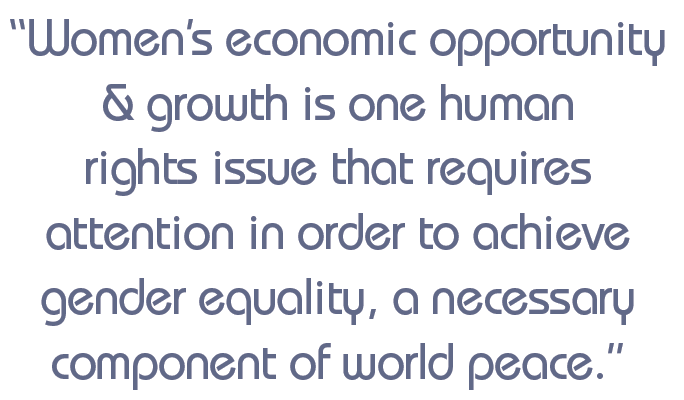 Women’s economic opportunity and growth is one human rights issue that requires attention in order to achieve gender equality, a necessary component of world peace. NAWRB is on the front lines of this issue—driving collaboration in the housing ecosystem for gender parity and women’s economic growth, and providing women with resources to secure their financial independence.
Women’s economic opportunity and growth is one human rights issue that requires attention in order to achieve gender equality, a necessary component of world peace. NAWRB is on the front lines of this issue—driving collaboration in the housing ecosystem for gender parity and women’s economic growth, and providing women with resources to secure their financial independence.
Wanting to get involved in the women’s movement, and apply the skills she learned in the classroom to the workforce, Marissa interned at NAWRB. She was pivotal in bridging our connections with the Netherland’s Ministry of Education, Culture and Science, and she continued this intermediary role when she returned home. Shortly after her internship, she secured an opportunity to work at the Dutch Embassy in Washington, D.C., where she currently resides.
MBA’s Independent Mortgage Bankers Conference 2018
Over 800 attendees were part of the MBA’s Independent Mortgage Bankers (IMB) Conference in Amelia Island Florida this week. The conference set new records of attendance which validates the increasingly important role that independent mortgage bankers, who now represent more than 50 percent of all mortgage originations volume, play in the mortgage market. The conference breakout sessions focused on providing practical strategies and tips to mortgage bankers that can be applied to strengthen operations, raise awareness of industry/policy trends, and incorporate changes to improve bottom line numbers. The MBA and many of the industry leaders who were presenting emphasized a continued commitment to enhancing diversity and inclusion. It makes good business sense to promote diversity and inclusion as it enhances decision making and helps mortgage bankers meet the needs of an increasingly diverse marketplace.
I was privileged to be invited as a speaker as part of the Business Operations and Compliance track for a session entitled “Three Great Ideas to Tighten Your Operational Efficiency.” The topic was near and dear to my heart since, through our risk management practice, we see some companies that demonstrate strong operational efficiency and demonstrate industry-leading practices that are worth sharing. I was thrilled to see many of my former colleagues from companies that I’ve worked for throughout my career in the audience. The panel discussion was moderated by David Lykken, President of Transformational Mortgage Solutions. Co-panelists were Frank Fiore, President of Matchbox, Inc and Brent Chandler, Founder & CEO of FormFree. The panelists led a lively discussion and provided strategies centered on three themes: Being Proactive, Workflow and Consistency. The discussion was particularly timely given the challenges many lenders face in this highly-regulated environment with multiple examinations, often concurrently, happening throughout the year. Regulatory and investor audits can often cause lenders to divert resources and incur additional compliance costs, which can be a challenge to ongoing attempts to maintain operational efficiency.
Has the Role of Women in Business Made Progress?
During 2017, there was a noticeable increase of women’s leadership conferences held across the country and the world. At these conferences, women participated in dialogues regarding business strategies and discussed mutual professional challenges. Thus, while 2017 was a year in which women made strides, what was the path leading up to this movement toward professional growth? Specifically, are women in the industries of real estate and technology ready for change?
History
Women first became involved in the real estate industry as brokers and agents in the late 1800s and became well accepted as real estate professionals due to, if nothing else, the sheer number of women involved in the industry. Today women hold the majority of residential real estate positions, but men still maintain most executive positions. In the commercial real estate market, men dominate the profession.
A 2016 Current Population Survey conducted by the U.S. Bureau of Labor Statistics found that women working in the real estate industry earn only 64 percent of a man’s annual average salary. While women have advanced in the residential real estate industry, they can still make strides by bridging the pay gap, gaining equal leadership positions and increasing sales in commercial real estate.
Compare this to women in technology. In the past thirty years, relatively few women have developed careers in technology fields, let alone high tech fields. In fact, according to the National Center for Women and Information Technology’s (NCWIT) 2016 Women in Tech Report, the peak of women’s involvement in technology occupations, such as computing industry careers, was in 1991 when women held 36 percent of computing jobs. Women’s involvement has never since reached this percentage, but as the world becomes increasingly reliant on technology, more women will likely enter the field.
Life of a Female Veteran: U.S. Army Combat Veteran Erica Courtney (part 2 of 6)
Towards the end of my tour I had set out to earn my spurs, an old cavalry tradition which signifies you are a cut above. This consisted of three days of physical hazing, meeting with a board of senior leaders to answer anything and everything about Cavalry tradition, and employing skills needed to meet the mission. For example, it could be a scenario where I would use my land navigation skills and find certain points. Upon arrival, the scene was some kind of chaos and you had to act under pressure. Or, it could simply be finding the right terrain to watch convoys and their movement to report back to headquarters. This involved carrying heavy equipment such as packs, radios, water cans and more. Prior to the spur ride they broke us into teams. No one wanted me, the female, on their team. Most of the teams were tankers stationed about 20 minutes away from the airfield. We did not know each other. There were a few aviators in the mix. I was assigned and the sighs were heard from my group as if they were expecting to have to tote me around. In contrast, at the end of the three-day event, the rater who was with our group from the start was absolutely flabbergasted at my performance. I steered the guys in the right direction when they became lost (a skill I learned well as an enlisted soldier thanks to a former commander), carried the biggest guy’s rucksack on top of mine because he hurt his ankle and was always the first to get up when needed. The guys were slow to move and tired. It was, after all, 3 a.m. and they had been through days of physical and mental tests. Upon our return to the endpoint, the chain of command had been made aware of my efforts and I had it a bit easier from there. My team stopped looking at me as a female and began seeing me as a teammate, exactly as it should be.
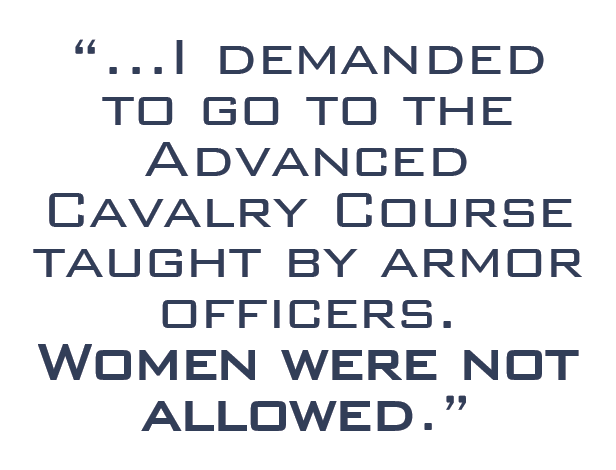 I was awarded my spurs and wore them with pride! One slight issue, women were not allowed to wear pants with their dress uniform, they only had skirts. It was the year 2000 and spurs looked absolutely ridiculous on heels with a skirt. I broke the rules and had a Korean tailor make my uniform pants like the guys wear. This is a big no-no in the service. Uniforms are important and you must stick to the regulation. When I showed up to the ceremony in pants, no one cared. “Looking good lieutenant,” is all I got from my senior leaders. That was liberating. The symbolism here was powerful. Integration is never easy, but it gets easier for those who come after us. We were blazing the trail. I learned early on that if baseless hatred gets to you, they win. I learned to overcome discrimination by working hard, being physically and mentally tough, and setting the example. Eventually, the same guys who did not want me there were the same guys not wanting me to leave. Earned spurs in hand, I left having made it easier for the women behind me and left the unit a better place.
I was awarded my spurs and wore them with pride! One slight issue, women were not allowed to wear pants with their dress uniform, they only had skirts. It was the year 2000 and spurs looked absolutely ridiculous on heels with a skirt. I broke the rules and had a Korean tailor make my uniform pants like the guys wear. This is a big no-no in the service. Uniforms are important and you must stick to the regulation. When I showed up to the ceremony in pants, no one cared. “Looking good lieutenant,” is all I got from my senior leaders. That was liberating. The symbolism here was powerful. Integration is never easy, but it gets easier for those who come after us. We were blazing the trail. I learned early on that if baseless hatred gets to you, they win. I learned to overcome discrimination by working hard, being physically and mentally tough, and setting the example. Eventually, the same guys who did not want me there were the same guys not wanting me to leave. Earned spurs in hand, I left having made it easier for the women behind me and left the unit a better place.
Congratulations, you are going to the 82nd Airborne Division. Wow, okay. I needed a tad of R&R as I was on alert the entire time in South Korea; for a year I was woken at all hours of the night and had five minutes to get dressed, throw on my gear, make it to the airfield and get my helicopter up and ready. No stress there. I went to Australia for a few weeks and became engaged to Chris, a fellow aviator I’d met years prior in flight school. It took nearly the whole two weeks to unwind. At the end of my stay, I became privy to the story of how he got the ring to present. Chris had ordered the ring to be delivered to Korea. Picture this, the FedEx truck pulls up to the gate, in the middle of nowhere, as the unit was on alert with an M1 Abrams tank pointed right at the entrance. Chris had told his First Sergeant (1SG) that if he ever saw a FedEx truck to do whatever he needed to do to get the ring. The 1SG saw the FedEx truck imminently leave and he began running down the road screaming at him to stop. The 1SG accomplished the mission, retrieving the ring and handing it safely off to Chris.
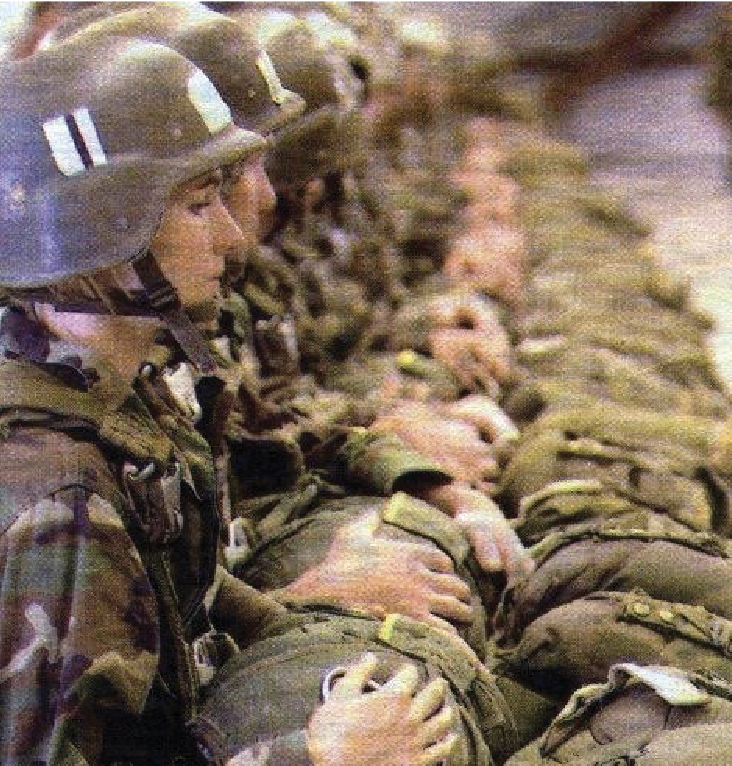
After my R&R, I was off to jump school. Talk about a sore body after two weeks of chilling. As an officer, you must be airborne qualified to be part of the 82nd Airborne Division. I thought it was strange; an aviator having to jump out of a perfectly good airplane? When was that going to happen? I learned that it happened a lot and it was an honor to be sitting next to colonels and privates alike. The Esprit de Corps at that unit was unlike anything I knew. We all had to go through crazy stuff together and it did not matter what you looked like or what your gender was. We are the all American unit. Welcome to jump school. Now do 10 pull-ups before you step over the line and begin your training.
I had the Cavalry brass insignia on my collar versus aviation and that got the attention of many. As usual, a few of the macho men types tried to break me, make me cry. Not happening. The majority of the men were cool, but I had come to expect a certain level of grief for being a cavalry officer, and a woman to boot. Some of the Navy Seals were the most supportive because they knew I could keep up; that was surprising to me. I thought they would be the hardest to win over. However, they are pretty secure in their own skin and appreciate hard work. It is tradition that the highest rank jumps out the door first. Lead from the front. Turns out, in my group, I was the highest ranking. I was what is called the chalk leader. You are standing by the door circling the drop zone and have to stare at the ground and throw any fear you may have out the window. Green light, go. No hesitation.
Scouts always lead from the front. Airborne!
Each unit got easier as my reputation preceded me. Senior leaders wanted me in their Cavalry units. However, at a level above them, so did the Brigade Commander as she was a proficient staff officer who managed 2,500 personnel, $75 million in equipment and over $200 million budgets and contracts. This hurt and helped me. I wanted to fly more and was requested, but kept getting pigeon-holed into logistics and contracts. At each location, there is no way the boss would let me out of the logistics position because I kept the aircraft flying, the unit out of trouble and the soldiers ready. In protest for all my hard work, tactfully, I demanded to go to the Advanced Cavalry Course taught by armor officers. Women were not allowed. After six months of hounding, my boss finally gave in. I was signed up and was Cavalry through and through. I was excited to learn so I could be better equipped to lead my men.
Again, being a bit naïve, I walked into the class and was completely ignored. A young officer grabbed me by the collar, threw me up against the wall and said that I didn’t belong there. None of the other men did a thing. No worries. They did not know who they were dealing with. Instead of whining or stating my case, I understood how to fight fire with fire, how men respond. Physically.
Now, women would not do this, but if you impress men physically, you are in. I reached out to him, grabbed him by the collar, and pinned him on the ground in a position from which he was not getting up. Clearly he did not know that I was an MP and was often used as a demonstrator on how to take a man down despite size. Now I was ready. Physical prowess, check. Mental toughness and expertise was still ahead of me. I ended up teaching half my class how aeroscouts integrate with ground forces because I lived it in Korea. I understood Cavalry tactics more so than most thanks to that assignment. I graduated, got my certificate and moved on. Turns out I was the first female to ever graduate from that school. It was never my intent to be the first, but it kept happening.
September 11th, 2001. A day that changed the nation. I was working in my office with a long line outside my door and got a call that a plane hit one of the towers. Why were they calling me about this unfortunate accident? Little did I know, like the rest of the country, the gravity of the situation.
The second call, “You may want to take a look.” Two planes now each targeting the Towers. What? Okay, let’s turn the TV on. The rest is history.
I slept in my office for two nights straight as the base was locked down. No one knew how to handle something like this. Of course the 82nd Airborne Division was the first to get the call, they are America’s 911 force with the ability to deploy anywhere in the world within 18 hours. As the senior logistician for anything aviation, my world became very busy. Nothing moved in Afghanistan without air assets due to the terrain and scarce roads which were mostly controlled by the Taliban.
Then came my next assignment at the 10th Mountain Division where I was pushing guys out to Iraq, bringing them home and co-managing the effort in Afghanistan. While there, the pace was rapid keeping up with troop demands in the far reaching areas of the country. I had to work with locals, contractors and leaders in order to skillfully get supplies through Taliban strongholds. They were not used to taking orders from women but they were respectful.
While there, I witnessed things most American’s will never have to. The land is littered with landmines left from the Russian invasion in the 1980s. I organized a food and clothing drive for local kids, and while I was distributing the items with a small team, attacks followed. You can’t really trust anyone in a time of conflict. Also, tall mountains made for some hairy flying. Most flight corridors were in between two tall mountains and there were men at eye level (about 7,000 feet) waiving to you with a radio in one hand and a rocket-propelled grenade launcher in the other. It was unnerving to say the least. I was able to determine very quickly that communications were terrible due to terrain and antiquated systems.
Because I worked in contracting, I was able to research state-of-the-art radio systems and pass my request up through the highest levels of leadership in country to get the $20 million in funding to equip all my aircrafts and increase effectiveness. This saved countless lives in the air and on the ground.
While on base, rocket attacks happened frequently. Rest was minimal and when it happened, my wooden shelter was right off the airfield with loud jets and helicopters flying non-stop. If you want to call it lucky, I had to leave earlier than the rest of my unit to bring the other half back from Iraq. It was a fast-moving train of events and you either kept up or got left behind. People forget that every time an aviator straps in their aircraft, things can and do go wrong whether it is training or war. When something catastrophic happens, there are investigations because the Army, manufacturers and family members want answers. I have had to investigate crashes and similar traffic accidents in Germany. It was hard to process, especially if I knew the people. Lest we forget.
What Working Women Give Up to Climb the Executive Ladder
 Professional and high-achieving working women have to give up a lot to climb the executive ladder. What does it mean to sacrifice and what are those things that are sacrificed in the pursuit of the executive woman’s life?
Professional and high-achieving working women have to give up a lot to climb the executive ladder. What does it mean to sacrifice and what are those things that are sacrificed in the pursuit of the executive woman’s life?
According to definition.com, sacrifice is the “forfeiture of something highly valued for the sake of one considered to have a greater value or claim.” From this context, working women are giving up things they highly value for their careers in which they feel are of greater value. What are the things that are given up or forfeited? The biggest one is relationships: relationships with themselves, spouses, children and friends.
There is still great societal expectations, or perceived expectations women place on themselves, to be a great wife, mother and maintain the household. In order to do all of the above and work a demanding career, something is bound to be lost or sacrificed for what is believed to be the greater good to the family or individual.
Women and the Second Shift
When the paid workday ends, the non-paid day begins and this can be taxing on an already jammed-packed day. According to salary.com’s “What’s a Working Mom Worth” 2016 survey, women spend an additional 59 hours per week working on the household. Part of the problem is that the husbands have not picked up a large enough portion of the traditional household responsibilities.
This rings true for even some of the highest-achieving executive women. Statistics from the National Parenting Association show that only 9 percent of their husbands take responsibility for meal preparation, 10 percent for the laundry and 5 percent for cleaning the house. When you throw children in the mix, it does not get better: only 9 percent take off work when the children are sick, 9 percent take the lead in helping with homework and a meager 3 percent help plan activities. With the expectations for women to be able to have it all, the balance can be more than overwhelming, and the fear of failure by asking for help compounds it all.
Women Leaders at the Front of the Line – NDILC in the News
Women Leaders at the Front of the Line – NDILC in the News
The NDILC are dedicated to helping raise the number of C-suite women and grow women’s employment at all levels in the housing ecosystem. Read below to find out how our council members are making a difference for women, local communities and the world at large.
Happy Mother’s Day from NAWRB!
On Sunday, May 13th, Americans will celebrate Mother’s Day, a national holiday honoring mothers and motherhood. Mother’s Day was first organized by Anna Jarvis in Grafton, WV and Philadelphia, PA on May 10, 1908. As the annual celebration gained popularity, Jarvis requested that Congress officially recognize a day to honor mothers. In 1914 Congress designated the second Sunday in May as Mother’s Day.

 Login
Login








